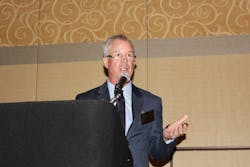At the Collision Industry Conference meeting held during the 2014 SEMA Show in Las Vegas, long-time shop owner Randy Stabler was handed the reins as the organization’s 16th chair, taking over for State Farm’s George Avery, whose two-year term officially ended.
In addressing the crowd at the meeting, Stabler drew a parallel to Abraham Lincoln—our country’s 16th president—in that he was looking at a house divided. As the industry changes, the schism between large multiple-shop operations and single-facility collision businesses grows deeper each day, he said.
Stabler, co-owner of the seven-shop Pride Auto Body in Southern California, sees CIC as a body that can help bridge that gap.
“How do we meld those two factions?” he asked, rhetorically, in an interview with FenderBender. “We need everyone to have a voice. [CIC] needs to help provide that debate and that transparency and let everyone’s voice be heard. We need to find solutions together. CIC can be part of that solution.”
Stabler shares his thoughts on a wide range of topics,
including the future of CIC and the biggest issues facing the collision repair industry.
You mentioned the relevancy of CIC during your speech. Do you feel CIC is relevant in today’s industry?
The reason I made that comment and why I have the belief that some feel it’s irrelevant is because the demographics of the collision repair industry are
changing. The large consolidators, funded by private equity investments, are growing. The large dealership segment is growing, whereas the independent, small dealership segment is shrinking. Combine that with the fact that margins are shrinking for the independent shop owner. They’re hurting more, and they’re more militant because of that.
The auto body component of the industry is somewhat divided because of their voice. Consolidators and large dealership groups embrace the insurance company as a referral source, with all the challenges that brings—which is insurers controlling the prices. The independent shops are resisting. We can’t get together on this.
Because of that, people have stayed away [from CIC]. Those large MSOs don’t want to align themselves with people who are vilifying the people they want to be partners with.
Twenty-five years ago, participants at CIC, from the body shop side, were more aligned. The voice of collision repairers was aligned.
Now, it’s somewhat divided.
What role does CIC play in this?
CIC’s role is to bring awareness and propose specific solutions. It’s in our mission statement on our website. I think we can morph into more of a think tank, where we can include more industry people and include a wider range of topics.
We need to get these important topics out of the dark and onto the table and look at them. Businesses can’t help each other come up with ideas unless we all understand the impact we have on one another. Industry segments can’t make decisions in silos. Take State Farm’s rollout of PartsTrader—it could’ve been a good idea for the industry, but because they made the decisions in a silo and didn’t discuss it, it ran into pitfalls and was met with a huge amount of resistance.
CIC needs to be that forum to build awareness where we can debate issues and allow businesses to see how their ideas and processes can play out should they decide to implement them.
What do you feel you will bring to your role as chair?
The role of the CIC chair, as I see it, is to bring about that discussion and debate so that shops and business can gain knowledge and understanding before implementing these policies. My role is to bring about those topics and let them be vetted with other businesses.
“My role as CIC chairman isn’t about determining how we come together. My role is to bring about debate and transparency.”
—Randy Stabler, incoming CIC chairman
I’m in a unique position, being at the twilight of my career. I don’t gain personally from this. It’s about trying to make the industry better for everybody. The industry’s been good to me, and I want to apply what I’ve learned to try to help expose some of the inefficiencies we’re facing.
My only initiative is to create a better, more efficient working environment for our industry.
How can CIC—and the industry in general—help narrow the schism that you mentioned?
My role as CIC chairman isn’t about determining how we come together. My role is to bring about debate and transparency. What I can say, though, from my experience, is why this occurs.
It’s a lack of understanding, and a lack of open dialogue between all parties in the industry. Let’s expose all of it. Let’s not sit around and lie to each
other, and say that it’s all fine.
For example, the insurance company says the policyholder is its number-one concern. Well, that’s not true based on actions, right? They have to answer, if they’re a publicly traded company, to their stockholders. That’s their primary concern. That’s fine. That’s what it is, but let’s not pretend it’s different. Let’s be honest and find a way to work with it.
The large MSOs and consolidators view things totally different than a single-location shop. They see the “injustices” from insurance carriers as just another item on a spreadsheet. It’s just another thing to deal with. It’s not personal, but that’s how the independent shop looks at it, because this is their livelihood.
We need to have open, honest discussions about this, and other issues too, like parts procurement, vehicle technology—all of it. We need to take the conversations we are always having in the hallways, and bring them into the forum of CIC.
That’s how we can come up with solutions, and that’s where CIC can make a difference for everyone.
You mentioned a few, but what are the key issues facing the industry today?
Parts procurement is going to continue to be a major issue for shops, regardless of size. That’s something every shop needs to be looking at, and looking to improve. It’s a critical issue for all of us.
Then there’s the ability for insurers to direct work to the repair channel they feel is in their company’s best interests. There are regulatory issues—insurance regulation issues. Minimum wage standards. Environmental issues. All of these things that we hear having impact on other businesses and industries, they are all already—or soon to be—affecting all of us.
Take environmental issues, for example. We all want to take care of the environment, but with that comes more regulation for our businesses. We want to protect the consumer and protect our employees—and all of
that puts costs on our businesses.
What do you see as the future of CIC?
Hopefully it becomes the forum we need. We need more industry-wide participation, and not just certain segments of the industry represented.
My hope is for more insurance company participation, more consolidator participation.
[CIC] needs to become a sounding board for the stakeholders in our industry, whether that’s suppliers, OEMs, insurers, anyone. CIC needs to become that place where those stakeholders come for a sounding board for policies and how they should be implemented. We can’t operate in silos—no segment of the industry can. My
hope is for CIC to be the place this discussion happens.
About the Author

Bryce Evans
Bryce Evans is the former vice president of content at 10 Missions Media, overseeing an award-winning team that produces FenderBender, Ratchet+Wrench and NOLN.
